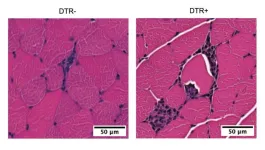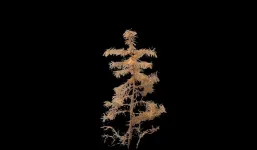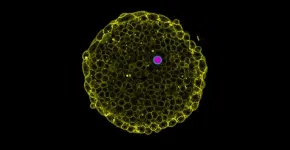(Press-News.org)
Joint press release by MARUM - Center for Marine Environmental Sciences at the University of Bremen and GEOMAR Helmholtz Centre for Ocean Research Kiel
The distribution of salt by ocean currents plays a crucial role in regulating the global climate. This is what researchers from Dalhousie University in Canada, GEOMAR Helmholtz Centre for Ocean Research Kiel, Alfred Wegener Institute, Helmholtz Centre for Polar and Marine Research (AWI) and MARUM – Center for Marine Environmental Sciences at the University of Bremen have found in a new study. They studied natural climate anomalies, including the so-called Little Ice Age. This cold period from the 15th to the mid-19th century led to poor harvests, famine and disease in Europe. Although the Little Ice Age is one of the most studied periods in recent history, the underlying climatic mechanisms remain controversial.
“Looking at recent, natural climate anomalies helps to understand the processes and mechanisms that human-induced global warming may trigger,” says Dr Anastasia Zhuravleva, lead author of the study. She was a PhD student at GEOMAR and received the Annette Barthelt Prize for her dissertation in 2019. She then worked as a post-doctoral researcher at GEOMAR and Dalhousie University, where the study was completed.
“Researchers often consider an increase in sea ice extent and desalination in the subpolar North Atlantic as possible triggers for past cold periods, but processes in the tropical Atlantic appear to be equally important," says Dr Zhuravleva. “In fact, in contrast to the northern and mid-latitudes, there is little information on these recent climate events from the subtropical-tropical Atlantic and their impact on regions in the Northern Hemisphere,” adds Dr Henning Bauch, paleoclimatologist at AWI and GEOMAR, co-initiator and co-author of the study. “This is where our research comes in.”
So, what happened in the tropical Atlantic during historical climate anomalies, and how might potential changes there have affected ocean circulation and climate much further north? To answer these questions, the team worked on a sediment profile from the southern Caribbean and reconstructed the salinity and temperature of the surface water over the last 1700 years. Among other things, the researchers determined the isotopic and elemental composition of the calcareous shells of plankton.
The results show a cooling of about 1°C during the Little Ice Age. “It is a significant temperature change for this region,” says Dr Mahyar Mohtadi, co-author of the study and head of the Low Latitude Climate Variability group at MARUM. “Particularly noteworthy is the occurrence of another pronounced cooling for the 8th-9th centuries. Colder temperatures in the otherwise warm tropical ocean led to lower regional rainfall, which coincided with severe droughts in the Yucatan Peninsula and the decline of the Classic Maya culture.”
In addition, the researchers found that the cold climate anomalies in the subpolar North Atlantic and Europe were accompanied by weaker ocean circulation and increased salinity in the Caribbean. “Advection, or the movement of tropical salt to high northern latitudes, is essential for maintaining high surface densities in the subpolar North Atlantic. This is a prerequisite for the overall stability of the large-scale ocean circulation, including the transfer of warm Gulf Stream water, which is responsible for our mild temperatures in Europe,” says Dr Bauch.
The data on the historical past thus allow a reconstruction of the connection across the North Atlantic. Initial cooling can be caused by volcanic eruptions, low solar activity and feedbacks between sea ice and the ocean in the north. The new study provides evidence that a decrease in salt movement to high northern latitudes will amplify and prolong these climate events. Conversely, the slow movement of positive salinity anomalies from the tropics will eventually increase the density at the surface of the subpolar North Atlantic. This may favour the northward transport of heat by ocean currents, resulting in milder temperatures over Europe and North America.
“Such a salinity feedback is known from models and has been assumed for the Little Ice Age. However, in the absence of tropical ocean data, these assumptions have been based on less direct precipitation records,” says Dr Zhuravleva.
There is evidence that the Gulf Stream is weakening and that human-induced warming is a likely cause. What is certain is that the consequences of this change will be global. The extent to which the different climate mechanisms interact has been an open question. This study now confirms that the south-north transport of salt is a key factor in the processes involved.
END
The connection between exercise and inflammation has captivated the imagination of researchers ever since an early 20th-century study showed a spike of white cells in the blood of Boston marathon runners following the race.
Now, a new Harvard Medical School study published Nov. 3 in Science Immunology may offer a molecular explanation behind this century-old observation.
The study, done in mice, suggests that the beneficial effects of exercise may be driven, at least partly, by the immune system. It shows that muscle inflammation caused by exertion mobilizes inflammation-countering T cells, or Tregs, which enhance the muscles’ ability to use ...
There are many creatures on our planet with more advanced senses than humans. Turtles can sense Earth’s magnetic field. Mantis shrimp can detect polarized light. Elephants can hear much lower frequencies than humans can. Butterflies can perceive a broader range of colors, including ultraviolet (UV) light.
Inspired by the enhanced visual system of the Papilio xuthus butterfly, a team of researchers have developed an imaging sensor capable of “seeing” into the UV range inaccessible to human eyes. The design of the sensor uses stacked photodiodes and perovskite nanocrystals (PNCs) capable of imaging different wavelengths ...
East Hanover, NJ – November 3, 2023 – Experts reported little change in October’s employment indicators, as people with disabilities extended their historic highs into the fall, according to today’s National Trends in Disability Employment (nTIDE) – semi-monthly update issued by Kessler Foundation and the University of New Hampshire’s Institute on Disability (UNH-IOD). As anti-inflationary measures exert their cooling effects on the economy, people with disabilities are striving to maintain their gains in the post-pandemic labor market.
Month-to-Month nTIDE Numbers (comparing September 2023 to October 2023)
Based on ...
Using global satellite data, a research team has mapped the tree cover of the world’s protected areas. The study shows that regions with abundant large herbivores in many settings have a more variable tree cover, which is expected to benefit biodiversity overall.
Maintaining species-rich and resilient ecosystems is key to preserving biodiversity and mitigating climate change. Here, megafauna – the part of the animal population in an area that is made up of the largest animals – plays an important role. In a new study published in the scientific journal One Earth, an international research team, of which Lund University is a part, has investigated the intricate interplay ...
As climate scientist Don Falk was hiking through a forest, the old, green pines stretched overhead. But he had the feeling that something was missing. Then his eyes found it: a seedling, brittle and brown, overlooked because of its lifelessness. Once Falk's eyes found one, the others quickly fell into his awareness. An entire generation of young trees had died.
Falk – a professor in the UArizona School of Natural Resources and the Environment, with joint appointments in the Laboratory ...
Researchers at DZNE and Charité - Universitätsmedizin Berlin have pioneered a novel treatment for the most common autoimmune encephalitis. By reprogramming white blood cells to target and eliminate disease-causing cells, the approach offers a new level of precision and efficiency. The technique has proven successful in laboratory studies, clinical trials in humans are already being planned.
NMDA receptor encephalitis is the most common form of antibody-caused brain disease, in which antibodies suddenly attack the brain, thus turning against the patient’s own body. “In ...
In order to survive, organisms must control the pressure inside them, from the single-cell level to tissues and organs. Measuring these pressures in living cells and tissues in physiological conditions is a challenge.
In research that has its origin at UC Santa Barbara, scientists now at the Cluster of Excellence Physics of Life (PoL) at the Technical University in Dresden (TU Dresden), Germany, report in the journal Nature Communications a new technique to ‘visualize’ these pressures as organisms develop. These measurements can help understand how cells and tissues ...
Texas is a huge state. And with that size comes soil diversity, supply chain delays, climate differences, material and labor costs and many other things to consider when evaluating the budget for a highway project.
To account for all of these variables, a University of Texas at Arlington researcher is building a price estimation and visualization tool for the Texas Department of Transportation (TxDOT) through a $200,000 U.S. Department of Transportation grant. Mohsen Shandashti, associate professor in the Department of Civil Engineering, is leading a team to develop that tool, which ...
Renia Gkountiou won the title of Female Innovator for 2023
She was nominated for her role in helping SMEs use and develop 3D printing
She is based at the Advanced Prototyping Facility which increases businesses’ awareness of 3D printing opportunities.
An Aston University engineer has been recognised at the 2023 Innovation Awards.
Renia Gkountiou who is as an engineer and technician within the University’s Advanced Prototyping Facility project won the title of Female Innovator for 2023.
She was nominated by professionals in her field for her role helping small to medium size businesses use ...
The reception at John Cadbury House brought together more than 70 business leaders and other senior figures from across the city and region
The Mayor of the West Midlands, Andy Street, was guest speaker at the event
Professor Aleks Subic shared the University’s vision and ambitions for the future.
Aston University celebrated the official opening of its new Birmingham city centre headquarters and the launch of its 2030 strategy at a reception at John Cadbury House on Thursday 2 November.
The event, hosted by the University’s Vice-Chancellor and Chief Executive, Professor Aleks Subic, brought together more ...







